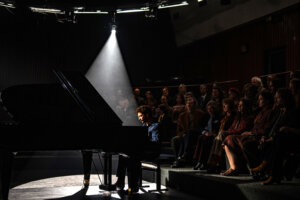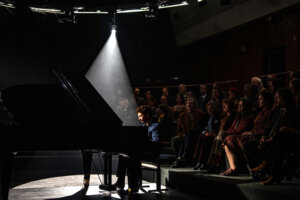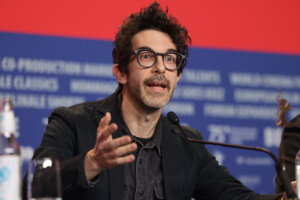Uncategorized
How a complete unknown created one of the most iconic music events of the 1970’s

“I’ve always been a stranger,” Ido Fluk told me when I met him in a near-empty conference room in a sleek, Nordic-designed hotel in Berlin this past February. It was the afternoon after the Berlin Film Festival’s world premiere of the Israeli director’s German-language film, Köln 75, a kinetic behind-the-scenes look at Keith Jarrett’s famous live album, The Köln Concert. Jarrett improvised the hour-long set at the Cologne Opera House on Jan. 24, 1975, on a substandard piano — a beat-up baby grand rehearsal piano instead of the 10-foot-long Bösendorfer Imperial he’d been promised.
The film has grossed over a million dollars at the German box office — no mean feat for a domestic production — and was nominated for four Lola awards (Germany’s version of the Oscars) including Best Picture.
Fluk, 40ish, with tousled hair and a thick mustache, stubble and round, dark-framed glasses, had a peripatetic upbringing. Born in Tel Aviv, he was raised both there and in Paris, where his family relocated for five years during his childhood. Just shy of 20, he moved to New York City to study at N.Y.U.’s Tisch School of the Arts.

He returned to Israel to shoot his first feature film, Never Too Late (2011) about a young Israeli man who comes home after eight years in South America and takes a road trip in his 1985 Volvo through the country he left behind. It holds the unusual distinction of being the first crowd-funded Israeli film and won the main prize at the Fribourg Film Festival. Fluk shot his next film, The Ticket (2016), about a blind man who regains his vision, in Kingston, New York. Köln 75 was filmed largely on location in Cologne.
“I’ve always been, like, moving around. So for me, it’s very natural to go to a new country to make a film,” said Fluk. “I also think it’s the story of cinema a little bit these days where art house cinema in the States is kind of a dying breed. You see more and more filmmakers from the U.S. traveling to Europe.”
“And, you know,” he added, “it’s also kind of the story of Keith Jarrett in the 70s, which is that jazz musicians were losing their audiences in the States, and they started coming to Europe, because in Europe they still found an eager audience for their work. So I could identify with that, in a way.”
Fluk was wearing a black T-shirt for the British punk rock band Idles that showed a man in a balaclava posing with a birthday cake. The image was captioned, “JOY STILL AN ACT OF RESISTANCE.” Fluk has a musical background. When he moved to New York, he played bass for “all these punk bands that never made it.” One band that sort of did was Elephant Parade, a lo-fi indie outfit that he formed with his now-partner, Estelle Baruch. They played legendary venues and festivals like CBGB and South by Southwest and even opened for Beirut.
“I’m not a good musician by any means,” he said, “but it helps you understand just how difficult what Jarrett is doing. It’s such a feat, what this man was doing in the 70s, which means driving in this tiny car, and every night showing up at a new city and playing a new thing that nobody’s ever heard before. He doesn’t think about it. He just starts playing.”

Despite, or perhaps because of, the respect that Fluk has for Jarrett (a reclusive artist, now 80, who had nothing to do with the film), the director did not set out to make a conventional biopic. Instead, the narrative and emotional center of the film, which Fluk also wrote, is Vera Brandes, the 18-year-old self-made concert promoter who, 50 years ago, signed Jarrett for the gig, sold out the venue, and convinced the reluctant pianist to perform on a subpar keyboard for the 1400-strong crowd that packed into the Cologne Opera House for the 11:30 pm concert. (The late hour was due to a performance of Alban Berg’s Lulu earlier that evening, a wonderfully strange detail that makes it into the film).
“There are a lot of movies about music that tell you the same story. It’s about the artist. It’s about his rise. There’s some complication, then there’s a comeback, there’s a big show at the end. And here was a story about the woman behind the scenes. It wasn’t a story about the artist so much as about the promoter and the invisible people behind the artist. I thought that was really interesting and fresh,” Fluk said. At the start of the shoot, Fluk invited Brandes, now 69, to visit the set, an event that he recalled as inspiring for him and the film’s team.
“She’s like a punk rock goddess from the 70s who, like, changed the world and never got a proper thank you. This was an opportunity to shine a light on her, because however good Keith Jarrett is, no Vera Brandes, no ‘Cologne Concert.’ If Keith Jarrett had the perfect piano on stage that night, the album wouldn’t sound the way it sounds, and it wouldn’t be as special as it is,” he said.
Mala Emde, a 29-year-old German actress, plays Brandes as a spirited and determined young woman striking out on her own, using her charm, enthusiasm and tenacity to navigate (and often bluff her way through) an exciting adult world that she cannot wait to enter. Emde carries the film on her capable shoulders. Jarrett, performed with brittle world-weariness by the American actor John Magaro, is another standout.
Köln 75 was in pre-production for four years and Fluk used that time to learn German. “By the time we were shooting, I already understood German. Now I can read, I can understand – I don’t like speaking it because I sound like an idiot — but it was enough for me to hear actors improvise, which was really important for me in this film, because it’s a film about improvisation and it needed to feel free,” he said. He added that Michael Winterbottom’s 2002 film 24 Hour Party People, about the birth of rave culture in late 1970s Manchester, was a key inspiration in terms of tone and energy, calling it “the spirit animal of this film.”
Fluk didn’t reveal too much about his upcoming projects, which include an HBO series based on the bestselling non-fiction book Empty Mansions and a legal thriller about the trial of Julius and Ethel Rosenberg, which Fluk described as “a really beautiful script and really important story about American Jews and the way they were perceived in America.”
With so many stateside projects lined up, can we expect Fluk to film again in Europe or Israel in the future?
“If the story I want to tell is located there? Absolutely,” he said. “I am very agnostic about territory. I have a film, and the film says where it needs to be shot, then we go there and shoot it.”
Köln 75 begins its theatrical run at the IFC Center in New York on Oct. 17. (It opens a week later in Los Angeles).
The post How a complete unknown created one of the most iconic music events of the 1970’s appeared first on The Forward.
Uncategorized
Jewish hockey star Jack Hughes’ overtime goal propels US to historic gold medal in Olympic hockey
(JTA) — Jewish hockey star Jack Hughes scored the game-winning goal Sunday to clinch a gold medal for the U.S. men’s hockey team, its first since 1980.
The New Jersey Devils star center, who had scored twice in Team USA’s semifinal win, sent the puck between the legs of Canadian goaltender Jordan Binnington 1:41 into overtime to give the American team a 2-1 win.
“This is all about our country right now. I love the USA,” Hughes told NBC. “I love my teammates.”
The win broke a 46-year Olympic drought for Team USA, which had not taken gold since the famous “Miracle on Ice” team that upset the Soviet Union on its way to gold in 1980. The United States also won in 1960.
“He’s a freaking gamer,” Quinn Hughes, Jack’s older brother and U.S. teammate said, according to The Athletic. “He’s always been a gamer. Just mentally tough, been through a lot, loves the game. American hero.”
Quinn Hughes is a defender for the Minnesota Wild and a former captain of the Vancouver Canucks who won the NHL’s top defenseman award in 2024. He was also named the best defender in the Olympic tournament by the International Ice Hockey Federation after scoring an overtime goal to send the U.S. team to the semifinals.
The third Jewish member of the U.S. team, Boston Bruins goaltender Jeremy Swayman, won the one game he played, a Feb. 14 preliminary-round victory over Denmark.
The Hughes family — rounded out by youngest brother Luke, who also plays for the Devils — has long been lauded as a Jewish hockey dynasty. They are the first American family to have three siblings picked in the first round of the NHL draft, and Jack was the first Jewish player to go No. 1 overall. They are also the first trio of Jewish brothers to play in the same NHL game and the first brothers to earn cover honors for EA Sports’ popular hockey video game.
Jack, who had a bar mitzvah, has said his family celebrated Passover when he was growing up. Their mother, Ellen Weinberg-Hughes, who is Jewish, represented the U.S. women’s hockey team at the 1992 Women’s World Championships and was on the coaching staff of the gold-medal-winning women’s team in Milan. Weinberg-Hughes is also a member of the International Jewish Sports Hall of Fame.
Hughes’ golden goal ushered in a burst of Jewish pride on social media, with one user calling it “the greatest Jewish sports moment of all time.” The Hockey News tweeted that Hughes was “the first player in hockey history to have a Bar Mitzvah and a Golden Goal! Pretty cool!”
Jewish groups and leaders also jumped on the praise train. “Special shout out to @jhugh86 on scoring the game-winning goal!” tweeted Jonathan Greenblatt, CEO of the Anti-Defamation League. “Beyond his incredible skill on the ice, Jack makes history as a proud representative of the American Jewish community, reminding us that the Jewish people are interwoven into America in her 250th year! Mazel Tov, Jack!”
The post Jewish hockey star Jack Hughes’ overtime goal propels US to historic gold medal in Olympic hockey appeared first on The Forward.
Uncategorized
Iran and US Views on Sanctions Relief Differ, Iranian Official Tells Reuters

Iranian women walk past an anti-US billboard in Tehran, Iran, February 19, 2026. Photo: Majid Asgaripour/WANA (West Asia News Agency) via REUTERS
Iran and the United States have differing views over sanctions relief in talks to curb Tehran’s nuclear ambitions, a senior Iranian official told Reuters on Sunday, adding that new talks were planned in early March as fears of a military confrontation grow.
Iran and the US renewed negotiations earlier this month to tackle their decades-long dispute over Tehran’s nuclear program as the US builds up its military capability in the Middle East, fueling fears of a wider war.
Iran has threatened to strike US bases in the Middle East if it is attacked by US forces.
“The last round of talks showed that US ideas regarding the scope and mechanism of sanctions relief differ from Iran’s demands. Both sides need to reach a logical timetable for lifting sanctions,” the official said.
“This roadmap must be reasonable and based on mutual interests.”
Iran’s Foreign Minister Abbas Araqchi said on Friday that he expected to have a draft counterproposal ready within days, while US President Donald Trump said he was considering limited military strikes.
READINESS TO COMPROMISE
While rejecting a US demand for “zero enrichment” – a major sticking point in past negotiations – Tehran has signaled its readiness to compromise on its nuclear work.
Washington views enrichment inside Iran as a potential pathway to nuclear weapons. Iran denies seeking nuclear weapons and wants its right to enrich uranium to be recognized.
Washington has also demanded that Iran relinquish its stockpile of highly enriched uranium (HEU). The UN nuclear agency last year estimated that stockpile at more than 440 kg of uranium enriched to up to 60% fissile purity, a small step away from the 90% that is considered weapons grade.
The Iranian official said Tehran could seriously consider a combination of exporting part of its HEU stockpile, diluting the purity of its most highly enriched uranium and the establishment of a regional enrichment consortium in exchange for the recognition of Iran’s right to “peaceful nuclear enrichment.”
“The negotiations continue and the possibility of reaching an interim agreement exists,” he said.
BENEFITS FOR BOTH SIDES
Iranian authorities have said that a diplomatic solution delivers economic benefits for both Tehran and Washington.
“Within the economic package under negotiation, the United States has also been offered opportunities for serious investment and tangible economic interests in Iran’s oil industry,” the official said.
However, he said Tehran will not hand over control of its oil and mineral resources.
“Ultimately, the US can be an economic partner for Iran, nothing more. American companies can always participate as contractors in Iran’s oil and gas fields.”
Uncategorized
Mike Huckabee’s Comments to Tucker Carlson on Israel and Middle East Land Draw Condemnation in Region

Tucker Carlson speaks on first day of AmericaFest 2025 at the Phoenix Convention Center in Phoenix, Arizona, Dec. 18, 2025. Photo: Charles-McClintock Wilson/ZUMA Press Wire via Reuters Connect
Comments by US Ambassador to Israel Mike Huckabee suggesting that Israel had a biblical right to much of the Middle East drew condemnation over the weekend from countries across the region, who called his remarks “dangerous and inflammatory.”
Huckabee, an evangelical Christian, has been a staunch supporter of Israel throughout his political career and a longtime defender of Jewish settlements in the West Bank – land which the Palestinians seek for a state.
In an interview with Tucker Carlson that was conducted on Wednesday in Israel and aired on Friday, the populist US talk show host asked Huckabee about Israel’s right to exist and about Jewish roots in the ancient land.
Citing the book of Genesis, Carlson asked whether the modern state of Israel had a right to the lands promised in the Bible by God to Abraham, stretching from the Euphrates River to the Nile, covering much of the Middle East. In response, Huckabee said:
“It would be fine if they took it all. But I don’t think that’s what we’re talking about here today.”
Huckabee added: “We’re talking about this land that the state of Israel now lives in and wants to have peace in, they’re not trying to take over Jordan, they’re not trying to take over Syria, they’re not trying to take over Iraq or anywhere else. They want to protect their people.”
In response, a joint statement condemning Huckabee’s comments was issued by the Palestinians and countries in the Middle East and beyond, including Jordan, the United Arab Emirates, Saudi Arabia, Egypt, Turkey, Indonesia and Pakistan.
They said his comments were: “Dangerous and inflammatory remarks, which constitute a flagrant violation of the principles of international law and the Charter of the United Nations, and pose a grave threat to the security and stability of the region.”
A US Embassy spokesperson said Huckabee’s comments did not reflect any change in US policy and that his full remarks made clear that Israel has no desire to change its current boundaries.
Israeli officials did not immediately comment on the interview or the reaction from countries that signed the joint statement.


